"Fiscal cliff" negotiations enter homestretch
(MoneyWatch) "Fiscal cliff" negotiations are coming into the homestretch, but sentiment seems to be shifting from "this must get done by year-end" to "it can happen in January too." Unlike the debt ceiling debacle in the summer of 2011, there is a little wiggle room when it come to the expiration of tax cuts and across the board spending cuts. Still, the longer it takes to make a deal, the larger the potential negative impact on the economy.
There is almost universal agreement that a deal must include tax increases and spending cuts, the combination of which would slow down the economy in 2013. But which specific parts of the cliff would do more harm to the economy? A refrain of the Grover Norquist crowd has been that lower taxes lead to economic growth; conversely, higher taxes curtail growth. The non-partisan Congressional Research Service (CRS) tried to weigh in on the matter in a September report that concluded "There is not conclusive evidence, however, to substantiate a clear relationship between the 65-year steady reduction in the top tax rates and economic growth." Democrats pounced on the report as proof that an increase of tax rates on the wealthy would not inflict major damage on the economy.
A subsequent kerfuffle erupted after the release of the report, as Senate Republicans claimed that the report was biased in tone and faulted its methodology. A month after its initial release, CRS withdrew the report. Last week, CRS released a revised report, addressing some of the concerns that Republicans raised. Still, the conclusion was the same: "The reduction in the top tax rates has had little association with saving, investment, or productivity growth. It is reasonable to assume that a tax rate change limited to a small group of taxpayers at the top of the income distribution would have a negligible effect on economic growth."
Economists caution that there are not enough high earners to tax to tackle the deficit, which is why both sides concur that the path to a deal must include both revenue and spending cuts. The public agrees: According to a recent Pew poll, nearly three-quarters of respondents (74%) say the best way to reduce the deficit is by both cutting major programs and increasing taxes. The problem is figuring out what to cut is hard-really hard.
When Pew drilled down to find out what people would be willing to cut, it found majorities continue to oppose making cuts in federal funding for several specific programs, including education (77% disapprove), roads and transportation (67%), programs to aid low-income Americans (58%) and military defense (55%). And majorities also disapprove of gradually raising the retirement age for Medicare and Social Security (56% each).
So when everyone complains, "Why don't they just make a deal?" the answer is: "It's not that easy." Then again, if you follow the Mayan calendar, all of the worry will be for naught -- the end of the world will occur on Friday! In case the Mayans are off on that prediction, there will be some other events on the economic calendar. New round of housing data could show mixed results, as multi-family starts could slow, as existing home sales increase. Personal income and spending are both expected to rise in November, which could provide a catalyst as we enter the last month of the year.
-- DJIA: 13,135, down 0.1 percent on week, up 7.5 percent on year
-- S&P 500: 1,418, down 0.3 percent on week, up 12.4 percent on year
-- NASDAQ: 2,978, down 0.2 percent on week, up 14 percent on year
-- January crude oil: $86.73
-- February gold: $1,697
-- AAA nat'l average price for gallon of regular gas: $3.27 (near low level for year)
THE WEEK AHEAD:
Mon 12/17:
8:30 Empire State Manufacturing
Tues 12/18:
10:00 Housing Market Index (homebuilder sentiment)
Weds 12/19:
8:30 Housing Starts (expected to drop, due to fall-off in multi-family dwellings)
Thurs 12/20:
8:30 Weekly Claims
8:30 Q3 GDP final reading (2nd estimate=2.7%)
10:00 Existing Home Sales
10:00 Philadelphia Fed Survey
Fri 12/21:
Quadruple Witching (contracts for stock options, single stock futures, stock index options and stock index futures all expire and there could be increased volatility)
8:30 Personal Income and Spending
8:30 Chicago Fed National Activity Index
9:55 Consumer Sentiment
